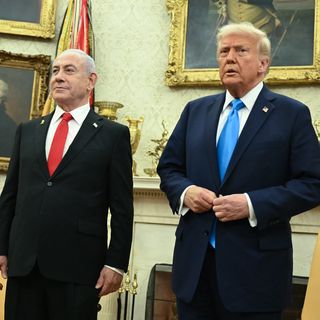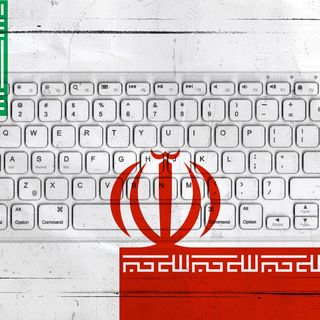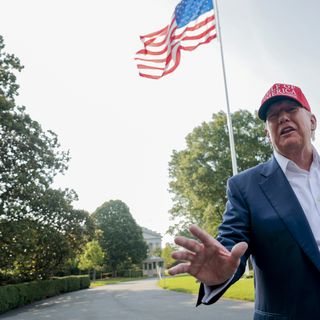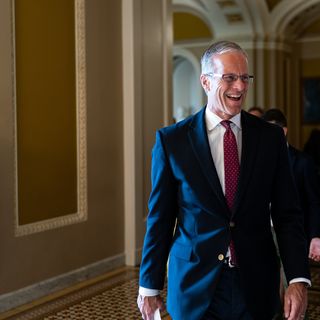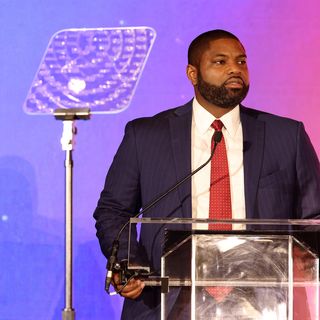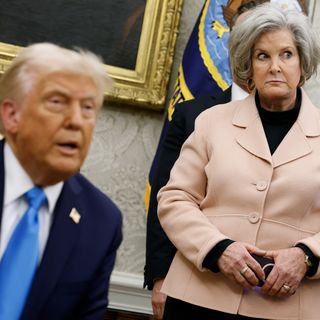Trump says Israel has agreed to terms for 60-day Gaza ceasefire
President Trump announced Tuesday that Israel has agreed to an updated proposal for a 60-day ceasefire in Gaza that would secure the release of some hostages.
- He urged Hamas to accept the deal, warning on Truth Social that "it will not get better — IT WILL ONLY GET WORSE."
Why it matters: Fresh off brokering a ceasefire between Israel and Iran after 12 days of war, Trump is now pressing for a breakthrough in Gaza, where the conflict has dragged on for more than a year and a half.
- The 60-day ceasefire, which has been under negotiations for months, would mark a significant step in this direction.
- There's no indication yet that Hamas is prepared to accept the terms of the deal.
Driving the news: Trump's announcement followed several hours of meetings Tuesday at the White House between his envoy Steve Witkoff and Israeli Minister for Strategic Affairs Ron Dermer, a top adviser to Prime Minister Benjamin Netanyahu.
- The two discussed an updated ceasefire and hostage-release proposal put forward by Qatar.
- Dermer informed Witkoff that Israel accepts the Qatari proposal and is prepared to begin indirect talks with Hamas to finalize the deal, a senior Israeli official told Axios.
What they're saying: "Israel has agreed to the necessary conditions to finalize the 60 Day CEASEFIRE, during which time we will work with all parties to end the War," Trump wrote on Truth Social.
- He said Qatar and Egypt, which have been mediating between the two parties, would deliver this "final proposal" to Hamas.
- "I hope, for the good of the Middle East, that Hamas takes this Deal, because it will not get better — IT WILL ONLY GET WORSE," the president warned.
Yes, but: It remains unclear whether the latest proposal addresses the core sticking point in the talks: Hamas' demand for a firm U.S. commitment that a 60-day ceasefire will lead to a permanent end to the war.
- In previous rounds, proposals were coordinated in advance by the U.S., Qatar, and Israel, but ultimately fell short of Hamas' expectations.
Behind the scenes: "We came with ideas, and our objective today was to get Israelis to agree. And they did," a U.S. official told Axios.
Zoom in: The draft agreement envisions Israel and Hamas using the 60-day ceasefire to negotiate both a permanent end to the war and a road map for governing post-war Gaza.
- For Israel, any long-term ceasefire must include the removal of Hamas from power, the dismantling of its military wing and the exile of its senior commanders.
- Israel wants Gaza to be administered by local Palestinian officials unaffiliated with either Hamas or the Palestinian Authority — with Arab states like Egypt, Jordan, the UAE and Saudi Arabia playing active roles.
What to watch: Israel on Monday ordered civilians in additional areas of Gaza City to evacuate south, signaling preparations for a potential expansion of the IDF's ground offensive.
- Israeli officials warn that if negotiations on the ceasefire and hostage deal don't advance soon, the military will escalate its operations.
- "We'll do to Gaza City and the central camps what we did to Rafah. Everything will turn to dust," a senior Israeli official told Axios. "It's not our preferred option, but if there's no movement toward a hostage deal, we won't have any other choice."


